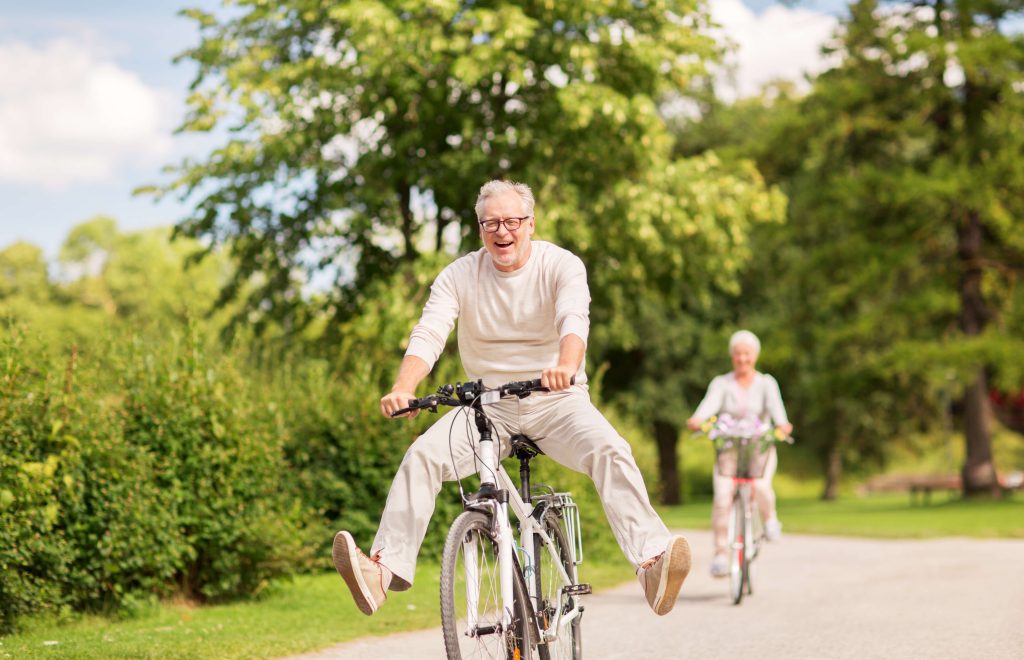How To Look After Mental Health In Later Life
Most of us go through times when we feel down, but in later life, we are more at risk of experiencing the effects of poor mental health. The transition into later life and the life events during this period can trigger anxiety or depression – the death of a loved one, starting retirement, loneliness, financial difficulties, or ongoing health issues are a few examples. Elderly people respond to mental health issues differently than younger people. They are prone to developing more psychological disorders and can cope less effectively with triggering factors of mental impairments. It’s certainly common for elderly adults to develop a routine that eventually dulls their spirit and negatively impacts their physical and mental health. But there’s good news: there are tons of stimulating activities to help improve quality of life. There’s a myriad of ideas that cater to a range of physical abilities and mental capacities, so you can engage in as many ways as possible.

Ready To Retire?
Retiring could be one of the most enjoyable but anybody who no longer has definite roles to take, apart from being an older member of society may begin to question their own importance, sometimes even existence. Discuss this with your employer if you want or need to keep working. Or, you may see this as an opportunity to work part-time, change to flexible working hours, or find a new job.
Loneliness
Let’s first take a look at how an older person lives. Since a retired person no longer holds a job, they are free to use their time on any activity he chooses. The problem though is that they may not be able to establish a certain activity that would make life enjoyable for the rest of their life. They also may feel that they are no longer important since the children who used to depend on them have already taken up their own lives. Or maybe they have no children or siblings.
Health Issues
Senior people tend to experience more health issues. As a result, in many cases, they take prescribed painkillers. Seniors are particularly vulnerable to prescription drug abuse and addiction. The prevalence of prescription drug abuse in the elderly may be as high as 11%. Opioids are the second most commonly reported substance of abuse by seniors. The number of fatal opioid overdoses among seniors has risen dramatically over the last decade. Hobbies help to keen healthier lifestyle.

Sense Of Purpose
In too many cases, people who are getting older are alone. They can all too easily and sadly sink into life without purpose, without direction, without a sense of worth. Slowly, they will have experiences that would negatively affect their mental health. They then become depressed, lonely, and more prone to developing psychological disorders. Since society gives far too little importance to elderly people, it tends to disregard them. Until they become debilitated enough due to sickness, disorders, and old age that society begins to notice them. But then, by that time, it is already too late.
The usual life of the elderly is marked by a lack of support that should introduce them to activities that will revitalize their lives. But by the time they are noticed, they can no longer put up with their old activities since their bodies, by nature, are struggling enough to hinder them from moving and performing as they did before.
Here are some of the hobbies that an elder could do to increase his mental health:
Walking & Exercising
Get your endorphins flowing with some form of physical activity! Take walks around the community, join an exercise group or sign up for swimming. Consider opportunities for organized exercise classes like yoga, senior aerobics, or other heart-pumping and strength-building options. If it’s difficult for you to leave home, consider setting up exercise videos to engage in via television or computer.
Care For Others
There’s no shortage of ways to be engaged in volunteering for a good cause. Participate in a food drive, toy drive, fundraising activity, or another service-minded event. Volunteering is a wonderful avenue for helping to prevent or overcome feelings of uselessness during this stage of life. Use their natural abilities to help someone else in need. Maybe this means cooking for a shelter, knitting, or sewing for the needy, visiting the sick, or planning a fundraiser. It might be as simple as wrapping gifts. The specific task is not nearly as important as the feelings of purpose and satisfaction they derive from this kind of activity.

Cooking & Baking
Perhaps you are a foodie at heart. Get involved in opportunities for meal planning, preparation, cooking, baking, and serving. This can involve simple recipes for options like cookies or pancakes, or it might include more complex menus that require greater skill and ingenuity in the kitchen. Cooking and baking alone or together has the potential to be a fun and stimulating activity with some pretty delicious outcomes!
Writing
For some people, the mere fact that they are thinking and can still conceptualize thoughts drive them to be happy about life. It is never too late to learn to write and for people who used to enjoy writing during their younger years, it is never too late to bring back their attitude toward literature.
Try a little genealogy research. There are many free, helpful tools available online. A good place to start is the National Archives. There are also paid services such as MyHeritage.com. You can even explore your origins at the DNA level with a test kit from AncestryDNA.
Enjoy Reading
Reading could also be a fun activity that would easily let time pass. Older people who enjoy reading are apparently happier than those who sat on their couches throughout the day.
Learn A New Language
All it takes is time and practice. But the hours you commit are worth the investment. Here are six of the best language learning apps you can try while you’re sheltering in place at home: Rosetta Stone, Babbel, Duolingo, Drops, Memrise, and Busuu.
What About Music?
Your fingers may not have the same dexterity they had when you were younger but this doesn’t mean that you can no longer enjoy music. You can learn to play musical instruments. The piano, for example, requires a little energy output but the internal satisfaction it provides is high.
Also, listening to music could make you think of familiar thoughts that would drive you down memory lane. This would allow you to meditate on your life. For most people, knowing the fact that they have lived their life well makes them satisfied and at peace with themselves. Internal peace is central to achieving the right balance in life.
Pet Therapy
Animals have a special way of bonding with people. If you are an animal lover, spending time with pets and other animals could be a highly engaging activity. From dogs and cats to fish and birds, there’s so much to be gained from a chance to connect with animals. Research has shown that doing so can help to increase overall physical and mental well-being.
Play Board Games
These fun indoor activities for seniors (or anyone) are a great way to spend time while keeping your mind sharp. Classics like Scrabble, Yahtzee, chess, and dominos are fun options, but there are also some fantastic newer games such as Qwirkle and Apples to Apples you should try as well.
Pick Up Your Old Hobbies
Did you enjoy gardening as a kid or collecting things as a teenager? You can bring back those old hobbies. After all, you already have enough investments in the past that it would no longer be hard for you to start again. Take up walking, hiking if you are still able, or swimming. Meeting friends and discovering new places through social groups is great for boosting self-esteem and helping loneliness.
Embracing Aging
There are always interesting, rewarding activities for seniors to make the most of their time — indoors and outdoors. It is often the case of losing the zest for life when one gets older. But by regaining your appetite for life through hobbies, you might find again that life is worth living for. You might think that pursuing new learning and work is just for young people, but volunteering, career changes, and returning to education are becoming more popular with people over 50. Many organizations depend on the skills and experience that older people possess. You’ll see the emotional benefits of keeping things bright and positive. You’ll feel better physically and mentally, too. These activities can keep you healthy and sharp. You may even find that you sleep better!


Some elderly people develop mental health problems or conditions, such as depression, dementia, or memory loss, as they age, but it isn’t an inevitable part of old age. However, if you think you are developing a mental health problem or condition, don’t worry; just take action, as treatments are available. If you are worried about your memory, or dementia, speak to your care provider for more information. If you are worried about your mental health problems or conditions, such as depression, or anxiety, contact us today.
If you need FREE help please contact the National Helpline about mental and/or substance use disorders, prevention, treatment, and recovery in English and Spanish.
Published: January 10, 2023
Last Updated: August 24, 2025

Published: February 14, 2026
Medication-Assisted Treatment (MAT): How It Works?
Summary: Medication-assisted treatment (MAT) is an evidence-based approach to addiction treatment that combines FDA-approved medications with behavioral therapy and counseling to treat substance use disorders — primarily opioid and alcohol addiction. MAT is endorsed by the Substance Abuse and Mental Health Services Administration (SAMHSA), the National Institute on Drug Abuse (NIDA), and the World Health […]
Read more
Published: February 06, 2026
Talk Therapy: Types, Benefits & How It Works in California
Summary: Talk therapy — also known as psychotherapy — is a structured, evidence-based treatment approach in which a trained mental health professional helps individuals identify, understand, and change the thoughts, emotions, and behaviors that contribute to mental health conditions and substance use disorders. It is the foundation of treatment for depression, anxiety, PTSD, personality disorders, […]
Read more
Published: January 27, 2026
What Is DPD? Understanding Dependent Personality Disorder
Most people don’t ask, “What is DPD or Dependent Personality Disorder?” They come in feeling drained, anxious, and stuck in relationships that feel restrictive yet hard to leave. Being alone feels unsettling. Decision-making feels paralyzing. Reassurance becomes a daily necessity rather than a comfort. At Overland IOP in Los Angeles, we often see Dependent Personality […]
Read more
